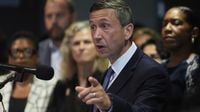On August 26, 2025, the Democratic National Committee (DNC) found itself at the epicenter of a heated internal debate, as members gathered in downtown Minneapolis for their annual summer meeting. The event, held behind a tight security checkpoint, was supposed to mark a decisive moment for the party’s stance on the Israel-Hamas war. Instead, it ended with a surprising reversal and a decision to delay any formal position for months, exposing deep divisions that have simmered within the Democratic Party for over a year.
According to the Associated Press, the DNC’s leadership had intended to clarify the party’s position on the ongoing conflict, a move anticipated by activists and officials on both sides of the debate. Two competing resolutions had been put forward: one from the progressive wing, and another backed by DNC Chair Ken Martin.
The progressive resolution was clear in its demands. It called for an arms embargo and the suspension of all military aid to Israel, reflecting the growing calls from the left for a stronger rebuke of Israel’s actions in Gaza. Meanwhile, Martin’s version sought a more balanced approach. It called for an immediate ceasefire, the unconditional release of all hostages, and the unrestricted delivery of humanitarian assistance — including food, water, medicine, and shelter — to civilians in Gaza. Importantly, it also reaffirmed the Democratic Party’s support for a two-state solution, a longstanding pillar of U.S. policy in the region.
The Resolutions Committee, after reviewing both proposals, voted to support Martin’s version and rejected the progressive alternative. That decision, however, did not end the debate. In a move that caught many in the crowded hotel ballroom off guard, Martin withdrew his own measure after only a brief discussion. He instead called for the formation of a task force to study the issue further, acknowledging the depth of division within the party.
“As we’ve seen there’s divide in our party on this issue,” Martin said, addressing the assembled members. “I’ve decided today, at this moment, to listen … so we can move forward united today and have the conversation.” His words, reported by the AP, underscored the sensitivity and complexity of the issue at hand. For many Democrats, the Israel-Hamas war has become perhaps the most divisive foreign policy question facing the party.
In the days leading up to the vote, the DNC’s Resolutions Committee was inundated with nearly 5,000 emails from activists and party members on both sides of the argument, a testament to the passion and urgency felt by many. The volume of correspondence reflected the high stakes: with the party’s base split, any formal position risked alienating one faction or the other, especially with next year’s midterm elections looming on the horizon.
For progressives, the withdrawal of the resolution was a bitter pill to swallow. Allison Minnerly of Florida, who had sponsored the progressive version, did not hide her disappointment. “There needs to be urgency,” Minnerly said, as quoted by the AP. “The majority of our party is looking for answers and leadership on this issue.” Her comments echoed a broader sentiment among left-leaning Democrats, who have pushed for a more forceful response to the humanitarian crisis in Gaza and greater accountability for U.S. military aid to Israel.
Others within the party voiced frustration over the continued lack of clarity. Harini Krishnan, a DNC member from California, expressed her own hopes for resolution, stating, “I also want to say that I truly hope as a party that we can move beyond this issue.” Her remarks, like Minnerly’s, highlighted the emotional toll the debate has taken on party members, many of whom feel caught between competing moral and political imperatives.
The decision to form a task force rather than adopt a formal resolution means that the DNC’s position on the Israel-Hamas war will remain undefined for the foreseeable future. Martin did not provide a timeline for when the new task force would report back or when a final decision might be made. The next scheduled meeting of the DNC is in December, leaving months of uncertainty ahead.
This delay prolongs what has already been a year-long struggle within the Democratic Party over how to respond to the war and the humanitarian catastrophe in Gaza. Even if the DNC eventually adopts a formal position, it would be largely symbolic, carrying no legal or binding authority over U.S. foreign policy. Yet, as party officials and activists know well, symbols matter — especially in an election year, when the party’s unity and message are under intense scrutiny.
The debate within the DNC reflects broader tensions in American politics over the Israel-Hamas conflict. For decades, U.S. political parties have grappled with how to balance support for Israel’s security with concerns about Palestinian rights and the humanitarian situation in Gaza. The Democratic Party, in particular, has seen its coalition shift in recent years, with younger and more progressive members demanding a break from traditional policies.
At the same time, party leaders are keenly aware of the risks of alienating more moderate or pro-Israel voters, some of whom play crucial roles in swing states. The competing resolutions at the Minneapolis meeting captured this tension: one side pushing for an unequivocal stand against military aid, the other emphasizing diplomacy, humanitarian aid, and a two-state solution.
For now, the DNC’s leadership is betting that more time and study will help bridge these divides. But with thousands of emails pouring in and passionate voices on both sides, it’s clear the issue won’t fade quietly into the background. The party’s eventual decision, whenever it comes, will be closely watched — not just by Democrats, but by voters and policymakers across the country and around the world.
As the DNC prepares for its December meeting, the question remains: can the party find a consensus on one of the most contentious foreign policy issues of the era, or will the debate continue to cast a shadow over its unity and electoral prospects?

